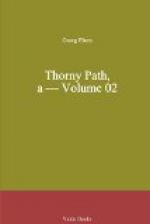“Yes,” he replied, emphatically; and when Melissa curiously inquired whether it were true that the followers of the crucified God had renounced their love for home and country, which yet ought to be dear to every true man, Andreas answered with a superior smile, that even the founder of the Stoa had required not only of his fellow-Greeks but of all human beings, that they should regulate their existence by the same laws, since they were brethren in reason and sense.
“He was right,” added Andreas, more earnestly, “and I tell you, child, the time is not far off when men shall no longer speak of Roman and Greek, of Egyptian and Syrian, of free men and slaves; when there shall be but one native land, but one class of life for all. Yea, the day is beginning to dawn even now. The fullness of the time is come!”
Melissa looked up at him in amazement, exclaiming: “How strange! I have heard those words once to-day already, and can not get them out of my head. Nay, when you confirmed my father’s report, I made up my mind to ask you to explain them.”
“What words?” asked Andreas, in surprise. “The fullness of the time is come.”
“And where did you hear them?”
“In the house where Diodoros and I took refuge from Zminis.”
“A Christian meeting-house,” replied Andreas, and his expressive face darkened. “But those who assemble there are aliens to me; they follow evil heresies. But never mind—they also call themselves Christians, and the words which led you to ponder, stand to me at the very gate of the doctrine of our divine master, like the obelisks before the door of an Egyptian temple. Paul, the great preacher of the faith, wrote them to the Galatians. They are easy to understand; nay, any one who looks about him with his eyes open, or searches his own soul, can scarcely fail to see their meaning, if only the desire is roused in him for something better than what these cursed times can give us who live in them.”
“Then it means that we are on the eve of great changes?”
“Yes!” cried Andreas, “only the word you use is too feeble. The old dull sun must set, to rise again with greater glory.”
Ill at ease, and by no means convinced, Melissa looked her excited companion in the face as she replied:
“Of course I know, Andreas, that you speak figuratively, for the sun which lights the day seems to me bright enough; and is not everything flourishing in this gay, busy city? Are not its citizens under the protection of the law? Were the gods ever more zealously worshiped? Is my father wrong when he says that it is a proud thing to belong to the mightiest realm on earth, before whose power barbarians tremble; a great thing to feel and call yourself a Roman citizen?”
So far Andreas had listened to her with composure, but he here interrupted, in a tone of scorn “Oh, yes! Caesar has made your father, and your neighbor Skopas, and every free man in the country a Roman citizen; but it is a pity that, while he gave each man his patent of citizenship, he should have filched the money out of his purse.”




